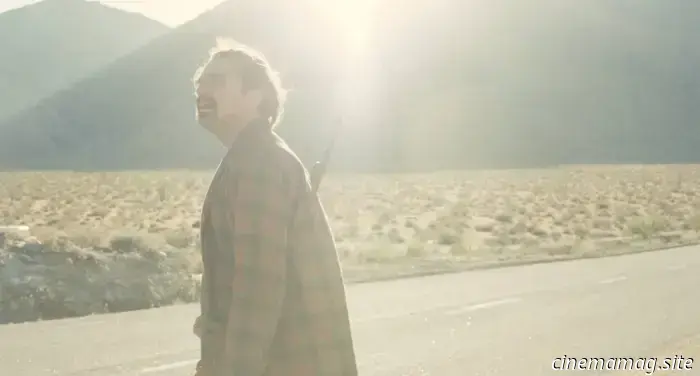-Movie-Review.jpg)
The End (2024) - Film Review
The End, 2024.
Written and Directed by Joshua Oppenheimer.
Featuring Tilda Swinton, George MacKay, Moses Ingram, Michael Shannon, Bronagh Gallagher, Tim McInnerny, Lennie James, and Danielle Ryan.
SYNOPSIS:
After years of isolation, a wealthy family residing in a salt mine encounters an outsider.
The setup of acclaimed documentary filmmaker Joshua Oppenheimer’s narrative debut, The End, seems to promise a biting critique of self-centered wealthy elites embodying the “I got mine, who cares about others” mentality, yet this sharp commentary never materializes. Instead, the director opts for a more character-driven, post-apocalyptic musical narrative, suggesting that such individuals are capable of self-reflection, can only fool themselves about their goodness for a limited time, and may change their behavior—while awkwardly introducing a Black woman outsider into the story, which further complicates the message by the time the credits roll.
The story revolves around an unnamed family surviving an unexplained apocalypse, taking refuge in an underground bunker resembling a salt mine connected by luxurious living spaces. Each family member is portrayed with varying levels of selfishness and unpleasantness. With recognizable actors like Tilda Swinton and Michael Shannon playing the roles of Mother and Father, one might expect some redeeming qualities, but Oppenheimer (co-writing with Rasmus Heisterberg) deliberately avoids this. The characters are largely dry and have started to believe their own fabrications, such as tall tales about Mother’s past as a Bolshoi dancer, or the distorted belief that allowing any desperate outsiders to share their haven would put them at risk.
One notable truth is that Father was a prosperous energy tycoon currently writing a book intended for whatever remains of human civilization or the future. His historical accounts are distorted, evading any culpability for the climate crisis. This also affects the education of Son, who is entirely inexperienced with the outside world, as he learns history through a sanitized diorama that glosses over atrocities with nostalgic embellishments.
A stranger, grappling with survivor's guilt, stumbles into their home, prompting the family to consider their usual response: kill the intruder and prioritize their own safety. Thankfully for this stranger, referred to as Girl (portrayed movingly by Moses Ingram), the family, having not faced such a scenario in a long time, has grown soft and hesitates to harm someone they don’t perceive as dangerous, especially since their son—and the butler and other associates—do not comprehend how this person could pose a threat. It is perhaps predictable that the Son begins to develop feelings for Girl as she gradually reveals the harsh realities of the world and its history, prompting him to question everything he knows, including the implications of that knowledge on his family.
While this could create conflict, The End does not pursue that avenue. Instead, it clumsily utilizes this suffering Black woman to encourage each character to engage in self-examination and seek forgiveness and, to a degree, redemption. This is an oddly misguided creative choice for a film focusing on wealthy elites, but it may not even be the most perplexing decision made.
The End also aims to be a Golden-age musical but falls flat. Many moments do not warrant musical interludes, a shortcoming exacerbated by ineffective lyrics and forgettable performances. There are occasional striking visuals in the bunker and shots within the salt mine, but overall, it feels like a filmmaker has ventured into a genre he is ill-equipped to handle. The overlap with the narrative styles Joshua Oppenheimer excels at in documentaries does not inherently translate into a well-crafted musical. While the notion of Michael Shannon singing might seem amusing at first, it ultimately adds another layer of disappointment in the execution. The closest the songs come to evoking any emotion is during a moment where Mother has an epiphany and confronts her unsavory past actions towards her extended family.
It would be misleading to claim there is no engaging drama; every character, including supporting roles, carries an unflattering history worth exploring, especially for added context. The frustrating aspect is that Joshua Oppenheimer uses these honest revelations to explore the potential for redemption each character can achieve and how much forgiveness they can extend to one another. Moses Ingram’s Girl is not just a catalyst for positive change in these characters but also seeks to be part of their narrative. If this doesn't already feel problematic, the majority of the songs are laborious to endure. The End? It’s a relief when it finally concludes.
Flickering Myth Rating – Film: ★ ★ / Movie: ★ ★
Robert Kojder is a member of the Chicago Film Critics Association and the Critics Choice Association. He is also the Reviews Editor for Flickering Myth. Check here for new reviews, follow my Twitter or Letterboxd, or email me at [email protected]
-Movie-Review.jpg)
-Movie-Review.jpg)
-Movie-Review.jpg)
-Movie-Review.jpg)
-Movie-Review.jpg)
Other articles
 Hasbro announces the release of new action figures for Star Wars: The Vintage Collection and The Black Series.
Hasbro has introduced a new selection of upcoming Star Wars action figures, featuring a redesigned Landspeeder from The Vintage Collection along with Luke Skywalker from A New Hope. Additionally, the Vintage Collection will include 3.75" figures for Dengar from The Empire Strikes Back, Alexsandr Kallus from Rebels, Asajj Ventress from The Clone Wars, and Carson Teva from Ahsoka, along...
Hasbro announces the release of new action figures for Star Wars: The Vintage Collection and The Black Series.
Hasbro has introduced a new selection of upcoming Star Wars action figures, featuring a redesigned Landspeeder from The Vintage Collection along with Luke Skywalker from A New Hope. Additionally, the Vintage Collection will include 3.75" figures for Dengar from The Empire Strikes Back, Alexsandr Kallus from Rebels, Asajj Ventress from The Clone Wars, and Carson Teva from Ahsoka, along...
 Star Wars: Hyperspace Stories – The Bad Batch: Ghost Agents #2 - Comic Book Teaser
Dark Horse Comics will launch Star Wars: Hyperspace Stories – The Bad Batch: Ghost Agents #2 next week, and you can enjoy an early look at the issue now with the official preview provided below… The Bad Batch competes against bounty hunter Embo to retrieve stolen intelligence that poses a risk to Republic spies everywhere! Their mission […]
Star Wars: Hyperspace Stories – The Bad Batch: Ghost Agents #2 - Comic Book Teaser
Dark Horse Comics will launch Star Wars: Hyperspace Stories – The Bad Batch: Ghost Agents #2 next week, and you can enjoy an early look at the issue now with the official preview provided below… The Bad Batch competes against bounty hunter Embo to retrieve stolen intelligence that poses a risk to Republic spies everywhere! Their mission […]
 One Battle After Another Trailer: Leonardo DiCaprio is on the Escape in Paul Thomas Anderson’s Action Spectacle
Although there has been a slight delay, Warner Bros. is demonstrating confidence in Paul Thomas Anderson's eagerly awaited One Battle After Another by releasing its first trailer six months ahead of the film's theatrical debut. This project, which is Anderson's largest to date with a budget reportedly between $115M and $140M, is set to be released on September 26.
One Battle After Another Trailer: Leonardo DiCaprio is on the Escape in Paul Thomas Anderson’s Action Spectacle
Although there has been a slight delay, Warner Bros. is demonstrating confidence in Paul Thomas Anderson's eagerly awaited One Battle After Another by releasing its first trailer six months ahead of the film's theatrical debut. This project, which is Anderson's largest to date with a budget reportedly between $115M and $140M, is set to be released on September 26.
 Jimmy Smits poised to reprise his role as Miguel Prado in Dexter: Resurrection.
Jimmy Smits is the newest addition from the original Dexter cast to join the upcoming sequel series, Dexter: Resurrection. He will be reprising his role as Miguel Prado, an Assistant District Attorney who became a serial killer. Smits' character was eliminated by Michael C. Hall's Dexter Morgan in the season three finale of the original series, [...]
Jimmy Smits poised to reprise his role as Miguel Prado in Dexter: Resurrection.
Jimmy Smits is the newest addition from the original Dexter cast to join the upcoming sequel series, Dexter: Resurrection. He will be reprising his role as Miguel Prado, an Assistant District Attorney who became a serial killer. Smits' character was eliminated by Michael C. Hall's Dexter Morgan in the season three finale of the original series, [...]
 NECA introduces What We Do In the Shadows to its Tiny Terrors collection.
NECA has revealed that series 11 of the Toony Terrors line, which includes Nandor, Laszlo, Nadja, Guillermo, and Colin from FX's popular vampire comedy What We Do in the Shadows, is now available for pre-order at a price of $74.95; you can view them here… Add a touch of Saturday morning cartoon fun to your horror collection with the […]
NECA introduces What We Do In the Shadows to its Tiny Terrors collection.
NECA has revealed that series 11 of the Toony Terrors line, which includes Nandor, Laszlo, Nadja, Guillermo, and Colin from FX's popular vampire comedy What We Do in the Shadows, is now available for pre-order at a price of $74.95; you can view them here… Add a touch of Saturday morning cartoon fun to your horror collection with the […]
 Trailer for the sci-fi horror film Wellwood featuring Keisha Castle-Hughes.
Uncork’d Entertainment has released a trailer, poster, and images for the sci-fi horror film Wellwood, directed by Eliza Hooper. The story centers on Nick, who undertakes a frantic quest to save his terminally ill wife, Laura, and encounters an alien being he believes has the power to heal her. The cast features Camille Balsamo-Gillis, Reid Collums, Keisha Castle-Hughes, and Lance E. [...]
Trailer for the sci-fi horror film Wellwood featuring Keisha Castle-Hughes.
Uncork’d Entertainment has released a trailer, poster, and images for the sci-fi horror film Wellwood, directed by Eliza Hooper. The story centers on Nick, who undertakes a frantic quest to save his terminally ill wife, Laura, and encounters an alien being he believes has the power to heal her. The cast features Camille Balsamo-Gillis, Reid Collums, Keisha Castle-Hughes, and Lance E. [...]
The End (2024) - Film Review
The End, 2024. Written and Directed by Joshua Oppenheimer. Featuring Tilda Swinton, George MacKay, Moses Ingram, Michael Shannon, Bronagh Gallagher, Tim McInnerny, Lennie James, and Danielle Ryan. SYNOPSIS: After being isolated for decades, a wealthy family residing in a salt mine meets an outsider. The concept of celebrated documentary filmmaker Joshua Oppenheimer’s narrative debut, The End, offers an intriguing […]
